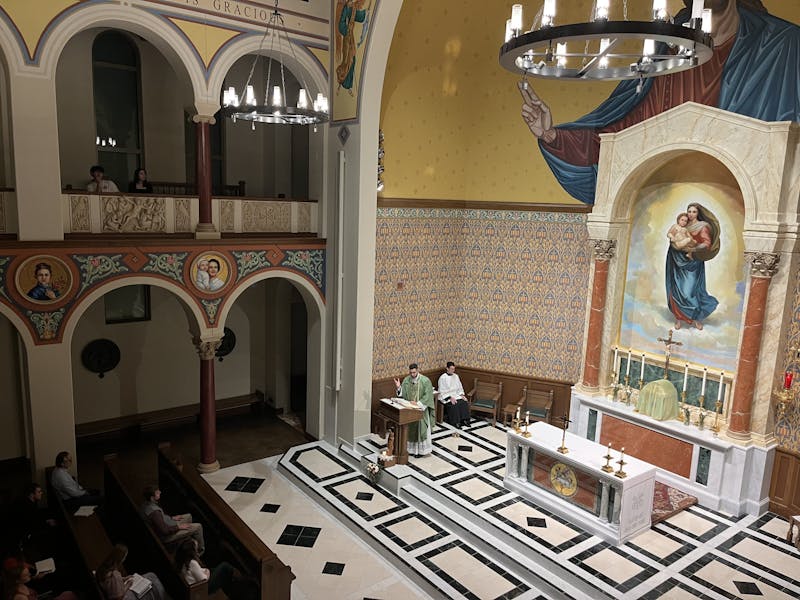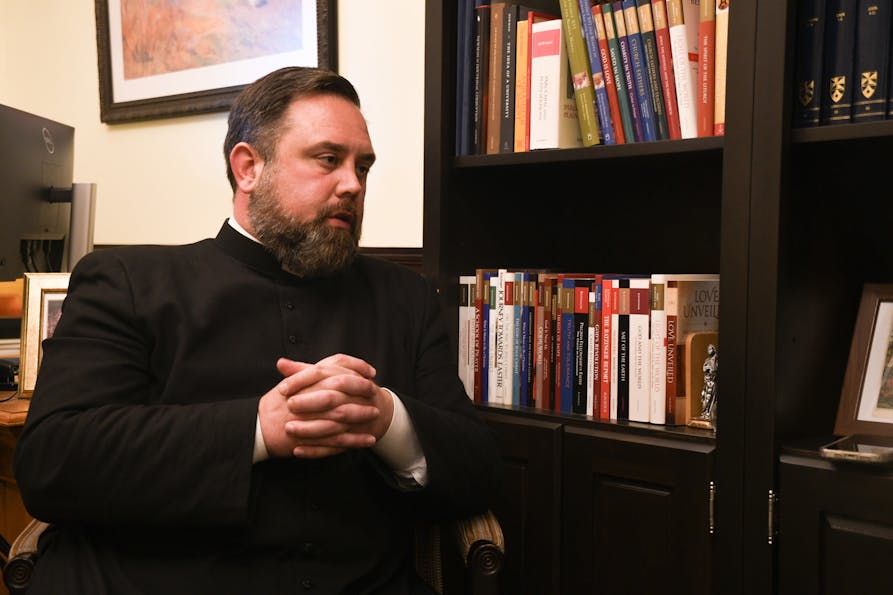As pastors of St. Paul’s, Fathers Eric Sternberg and Enan Zelinski believe their responsibility in the upcoming election is to be sources of information for Catholic students struggling to make a decision this election season. Here’s why.


In the chapel of St. Paul’s Catholic Student Center, light organ music plays as members shuffle in quietly, kneeling and crossing themselves before sitting down. The lights are dimmed as the procession enters the chapel, and the priest, Father Enan Zelinski, enters in long, green robes.
Incense pours out of a gold thurible suspended from gold chains and gently swung by a member of the procession. The smoke wafts up through the church while the choir sings praises and the congregation joins, their voices echoing. Zelinski leads the group in song before beginning his message.
As pastors of St. Paul’s, Zelinski and Father Eric Sternberg believe their responsibility in the upcoming election is to be sources of information for Catholic students struggling with making a decision. This particular service, the first of two before the election, was used to educate students on core principles from which to guide their ballot decisions.
“We don't preach particular people or particular parties,” Zelinski said during this Sunday’s evening service. “We preach eternal principles, principles of the church that we as members asked to put into practice when we go to vote for our elected officials.”

Father Eric Sternberg speaks with The Daily Cardinal in an interview on October 15, 2024.
Sternberg told The Daily Cardinal in an interview he considers himself to be “separate” from the secular world, but that’s not to say he isn’t living in it. He finds “great freedom” in remaining nonpartisan, and yet Sternberg underscored the importance of participating in the upcoming election.
“I’d argue there are a number of Catholics saying to themselves, ‘maybe I sit this one out,’” Sternberg said. “We’re here to remind you of the principles of which you are to guide yourself with. And then, remind you that you have a duty to vote.”
Sternberg believes it is unrealistic to expect to find a political candidate who fully aligns with Catholic principles, and discernment becomes essential when a candidate agrees with ideology on one issue but differs on another.
While Catholics may feel backed into a corner this election season, their duty to vote is one rooted in an understanding of the Catholic “common good,” according to Zelinski.
Sternberg told the Cardinal that Catholics understand participating in elections to be one of the ways people can seek the common good in society. He also said that Catholics find “no political home” in current politicians or politics.
Sternberg advises evaluating candidates based on a hierarchy of core principles, at the root of which is the right of a human person, which he says is “distinctly different” from individual rights.
“If we don't understand, as a society, respect for the person and for their inalienable rights, first among them being the right to life, everything else will fail. The first fundamental element of the common good is the respect of the person,” Zelinksi said during the service.
Catholics find themselves at a crossroads when evaluating candidates. For example, Sternberg noted the debate around border control to be particularly split. The church states clearly that lawfully organized states have the right to control who enters and leaves — meaning the state also has the right to return people who entered undocumented.
Still, another Catholic virtue is hospitality to strangers, which can lead to tension between upholding laws and responding compassionately to those seeking refuge.
“How can I maintain a just approach to immigrants within my society without maintaining integrity of the border?” Sternberg said. The question has been an ongoing debate for years.
He asserts that Catholics have a duty to be “reasonable in the choices they make.” Both sides could provide a reasonable justification for supporting their respective positions, he argued.
However, Sternberg said some methods used to maintain border integrity, such as camps and mass deportations, are unacceptable.
And while Sternberg encourages civil discourse among members of St. Paul’s, he places significant importance on respectful dialogue and encourages his congregation to engage in “vigorous debates” grounded in reason and civility.
“The attitude around St. Paul’s, as close as it is to the election, has actually been very peaceful. I've heard lots of students having conversations about ideas, and some of those conversations get very fired up,” Sternberg said. “But we’ve set the tone — If you want to have a screaming, shouting match, go to the bar.”
Indeed, the energy inside the church was quiet and respectful as members prayed “that those who govern will defend true justice.”
Members of the congregation sat silently after the sermon in a moment of reflection and prayer before resuming worship through song as the organ’s chords blended with the voices of the choir.